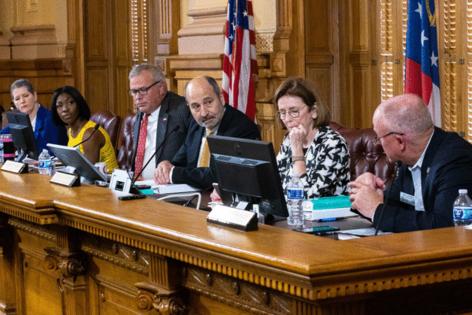Georgia Election Board weighs last-minute changes, including hand count of ballots
Published in Political News
ATLANTA — The Georgia Election Board will decide on sweeping rule changes Friday — less than a month before early voting begins — including proposals to hand-count ballots and require absentee ballot tracking that could cost $4 per voter.
All 11 proposals come from right-wing activists, voters or local election board members, and they’re up for approval by a State Election Board, whose three-member Republican majority was singled out for praise by former President Donald Trump at an Atlanta rally last month.
Election directors across Georgia oppose most of the ideas, saying they’re poorly thought-out, expensive and disruptive as they prepare for a presidential election expected to draw 5 million voters. They’re calling for a pause on alterations to established procedures, especially after many poll workers have already been trained.
The eleventh-hour initiatives are the latest efforts by the State Election Board to adjust the voting landscape in Georgia, a battleground state where the 2020 presidential race was decided by fewer than 12,000 votes and Trump made the false claim that the election was stolen.
The board has the power to craft election rules as long as they don’t conflict with state law. It previously approved new requirements before counties can certify results, raising concerns that local election boards could refuse to do so if their preferred candidate loses in November.
One of the most contentious rule proposals would require poll workers to hand count the number of ballots to ensure totals match the number of ballots recorded by voting machines.
Travis Doss, president of the state’s association of election officials, said the hand-counting rule would slow down reporting of results after the General Assembly passed laws requiring a quick count.
“If poll workers are having to stay at the polling place to hand-count ballots, the results are not going to be fast. They’re going to be delayed, and it’s going to be very late in getting the results,” said Doss, who is also the elections director in Augusta-Richmond County.
Supporters of the rule change say it’s needed to ensure no ballots are overlooked and all ballots are counted accurately. They say it wouldn’t take long for three poll workers in each precinct to sort ballots into piles of 50 and make sure the count is right.
“A policy that says the number of ballots in hand at the end of Election Day has to match the number of people who walk in that precinct, you have to be kidding me if you think there’s something nefarious about that,” Janelle King, a Republican appointee to the State Election Board, said last month. “I don’t want to hurt anybody. We’re not trying to make it difficult.”
King suggested amending the rule to allow the hand count to take place the day after the election, but Doss said that idea is still unworkable.
Doss said election workers would have to return the next day after working 14-hour shifts on Election Day to count ballots from the night before. In practice, Doss said the only way to do the hand count would be on election night.
Several county election boards and Republican Secretary of State Brad Raffensperger have warned the State Election Board against passing more new rules. They asked for a 90-day “quiet period” leading up to the election.
In addition, both Democrats and Republicans have filed lawsuits challenging the rules.
If approved, the rules would take effect as soon as Oct. 14 — the day before the start of early voting.
“It is far too late in the election process for counties to implement new rules and procedures,” wrote Charlene McGowan, general counsel for the secretary of state’s office, in a letter to State Election Board Chairman John Fervier. “If the board believes that rules changes are important for an election, the process should begin much sooner to allow for smooth implementation and training and include the input of election officials.”
Some of the rule proposals are impossible to implement so close to this year’s election, said McGowan and Doss.
For example, one measure would require absentee and emergency ballots, which are currently identical, to be visually different from each other. But ballots have already been printed, and absentee ballots will begin to be mailed Oct. 7.
The absentee ballot tracking initiative would also be difficult to achieve without government funding or a clear plan, they said.
Doss said certified mail delivery through the U.S. Postal Service would cost $4 per ballot, though supporters of the proposal have said they’d seek options that come with a minimal expense. Georgia already offers voters a way to track absentee ballots through a text messaging and email service called BallotTrax that notifies voters when their ballots are mailed and received.
Salleigh Grubbs, chairwoman of the Cobb County Republican Party, said the State Election Board needs to act to keep elections secure, even if it comes with a taxpayer expense.
“How much is your vote worth? I think it’s definitely worth it,” Grubbs said. “When it comes to the actual ballot that people cast, if it can ensure delivery and accountability that people actually receive their ballots and that the ballots don’t fall into the wrong hands, then I think it’s absolutely worth it.”
The State Election Board Chairman, John Fervier, said the board should slow down.
“The board is moving fast and furious with these rules instead of taking a more deliberative approach,” said Fervier, an appointee of Gov. Brian Kemp who is often outvoted by the board’s other three Republicans. “We should try and perfect these rules before they come before the board for a vote.”
11 proposed Georgia election rules
•Distinguish absentee ballots from emergency and provisional ballots with a marking in the top margin.
•Require a poll manager and two witnesses to record the ballot count from tabulation tapes on recap forms.
•Mandate hand-counts of the number of Election Day ballots cast to ensure they match the number of ballots recorded by voting machines.
•Mandate daily hand-counts of the number of early votes cast to ensure they match the number of ballots recorded by voting machines.
•Calls for reconciliation reports explaining discrepancies to be publicly posted.
•Retain memory cards that contain vote records to be stored for 24 months rather than data being uploaded and memory cards reused.
•Publicly post lists of registered voters before early voting begins.
•Require a daily reporting system for counties to publicize details of which voters have cast early and absentee ballots.
•Provide greater access for poll watchers in election tabulation areas.
•Reconcile ballot counts with tabulator tapes.
•Require absentee ballots to be tracked through the mail.
©2024 The Atlanta Journal-Constitution. Visit at ajc.com. Distributed by Tribune Content Agency, LLC.































































Comments